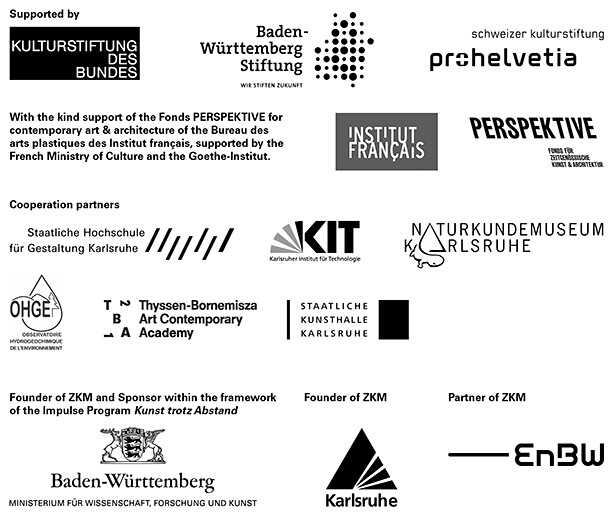Exhibition-making, education, and care in times of ecological crisis
Online conference: April 21–24, 2021
Lorenzstr. 19
76135 Karlsruhe
Germany
Hours: Wednesday–Friday 10am–6pm,
Saturday–Sunday 11am–6pm
T +49 721 81001200
info@zkm.de
Registration open from April 1 via zkm.de.
Speakers & performers
Astarti Athanasiadou, Marco Baravalle, Sarah Bovelett, Gilly Karjevsky and Rosario Talevi, Cara Courage, Diane Drubay, Formafantasma (Andrea Trimarchi and Simone Farresin), Mira Hirtz, Amal Khalaf, Hicham Khalidi, Jakob Kudsk Steensen, Klaas Kuitenbrouwer, Ku Kahakalau, Sonia Lawson, Pia Lindman, Alecia Neo, Marion Louisgrand Sylla, Nataša Petrešin-Bachelez, Lucia Pietroiusti, Ianina Prudenko and Alexei Shulgin, Farid Rakun, Tino Sehgal, Pooja Sood, Ela Spalding, Alison Tickell, Benoît Verjat, Peter Weibel tbc.
In recent years there have been numerous artistic and discursive contributions across museums, biennials, and institutions that all addressed the following question: How can art contribute to fostering solidarity, ecological becoming, and multispecies caring? The emergence of this “terrestrial turn” in cultural spheres has been, however, codependent on the globalization of the art industry and its reliance on abundant fossil energy, cheap flights, and material accumulation. Simultaneously, postcolonial debates have also gained visibility in cultural spaces historically established on colonial theft. How can institutions reflect their footprint and conditions of production despite being situated in a capitalist context? In other terms, can the institution be trusted to reinvent itself and, if so, what should a museum be?
In sustainable economics, “permacircularity” advocates resizing organizations in balance with Earth systems, while also retooling knowledge and practices towards planetary reparation. Taking as a point of departure the ecological blind spot of the exhibitionary complex, this assembly convenes institution leaders, curators, activists, artists, and educators to explore museums’ potential to become agents of radical mutation.
Over several days, the event brings together keynote addresses, case studies, roundtables, professional workshops, and artist performances to discuss the future of art institutions, share experiences, and explore alliances with radical and grassroots movements. The conference is initiated in the framework of the project Notes Towards a Permacircular Museum by Stéphane Verlet-Bottéro for the exhibition Critical Zones. Observatories for Earthly Politics. Following an exercise in mapping the show’s environmental footprint and a collective effort to restore an abandoned fruit orchard near ZKM, the project explores the possibility of expanding museum maintenance practices to more-than-human solidarity and sheltering.
Program
Time zone: CEST, schedule subject to change
Wednesday, April 21
2–3:30pm: Opening remarks—Harvesting questions (Livestream via zkm.de)
4–6pm: Re-Imagining institutions—moderated by Lucia Pietroiusti
Thursday, April 22
2pm: Performative walk
4–6pm: Mobility and art practices—moderated by Martin Guinard
6:30–8:30pm: Towards terrestrial practices in exhibition-making—moderated by Daria Mille and Matthias Gommel
Friday, April 23
2–4pm: Museum as shelter—moderated by Stéphane Verlet-Bottéro
5–7pm: Observatories for earthly education—moderated by Barbara Zoé Kiolbassa and Alessandra Pomarico
7:15–8pm: Closing remarks—Prospects for permacircular museums (Livestream via zkm.de)
Saturday, April 24
4:30–5:30pm: Kitchen_Ferm_Lab digital, special edition: Vegan Honey (registration via workshops [at] zkm.de)
Join the Critical Zones Telegram group here.
You can find further information on the updated program here.
Conceived by Barbara Zoé Kiolbassa, Jessica Menger, Daria Mille, and Stéphane Verlet-Bottéro.



